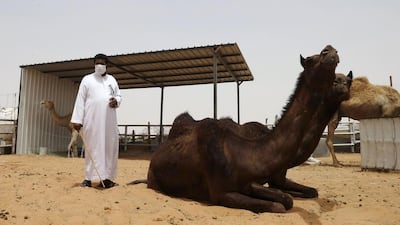DUBAI // The discovery of airborne particles of the Mers coronavirus in a Saudi Arabian camel shed could be the first step in discovering how the deadly virus is transmitted from animals to humans.
The discovery, say virology experts, is concerning and needs more follow-up research. However, they caution that it is far from proof that the coronavirus is freely transmitted by air.
“The clear message is that detection of airborne Mers-CoV molecules warrants further investigation and measures to prevent possible airborne transmission of this deadly virus,” said Esam Azhar, leader of the research team at King Abdulaziz University in Jeddah.
The Saudi scientists found an air sample with fragments of Mers coronavirus at a barn near Jeddah, which housed an infected camel.
The barn was owned by a 43-year-old man who was also infected with the virus, and later died from it.
Until now, medical researchers have been unable to clearly determine how the infection is transmitted. A few victims of the virus have had no known contact either with camels or with other infected humans.
“While airborne transmission of Mers-CoV could alter our view of the virus, it is important to note that the research does not indicate how easy airborne transmission to humans could be, or even how long the virus remains viable in the air,” said Dr Salwan Ibrahim, regional medical director for global health issues company International SOS.
Airborne transmission is where viruses travel from one host to another on dust or respiratory droplets.
The Jeddah air sample, collected on the day that a camel was confirmed to have the virus, contained Mers DNA identical to fragments found in the camel and its owner.
But Dr Ulrich Wernery, director of the central veterinary laboratory in Dubai, said the case did not mean the virus was transmitted by air.
Particles could be airborne and “completely harmless”, said Dr Wernery, whose research suggests camels could be responsible for passing the virus to humans.
“These are only particles of the virus, not the virus itself,” he said.
“You can imagine in the air there is everything – not only virus particles but bacteria, everything. The air always is going to have micro-organisms and we inhale them all the time but we are still very healthy.”
Airborne viruses such as influenza are more likely to spread in populated areas than those that can only move by contact transmission – either from animal to person, or person to person.
Dr Wernery said transmission of Mers requires close physical contact with an infected person or animal.
The coronavirus is unlike flu viruses, which are mainly spread by droplets created when infected people with cough, sneeze or talk, he said.
“We know that is not the case with Mers. Mars is very different. It is by very, very close contact” with the infected.
Dr Ibrahim, based in Dubai, said prevention was still the key to minimising the spread of infection.
“Be sure to cover your mouth when coughing or sneezing, wash your hands frequently, keep a distance from infected people and avoid contact with wild animals, especially camels,” he said.
The origin of the virus is unknown but several studies have supported the premise that camels are the most likely source of transmission from animals to humans.
Middle East respiratory syndrome is a virus causing acute, serious respiratory illness with symptoms including fever, coughing and difficulty breathing.
The Mers coronavirus was identified in 2012. Globally, 837 laboratory-confirmed cases of infection with Mers, including at least 291 related deaths, have officially been reported to the World Health Organisation.
jbell@thenational.ae

